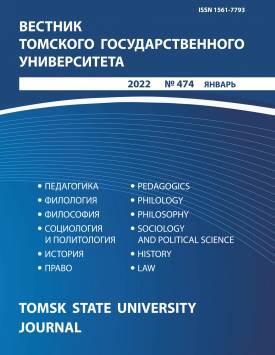“Right to the city”: Political construction of the post-pandemic world order
Lefebvre's statement that with the advent of capitalism the state and the city turned into abstractions, and that the rules for the cities are written by those who do not live in them, namely administrative powers and corporations, is legitimate. Informatization, the so-called “information society”, does not solve the socioeconomic problems of the disruption. The informatization of space does not solve the problem, but rather generates “cybernan-thropes” (Lefebvre), creating an illusion of prompt solution of complex management tasks. Without denying the successes of the information revolution, even agreeing conditionally with the concept of the “fourth industrial revolution”, we are forced to support infoskeptics who wrote that information discourse and information strategies in general resemble the manipulations of illusionists. Lefebvre's original triad, described in The Production of Space, encompasses firstly spatial practice, including everyday reality. Secondly, it encompasses the representation of space, as a product of intention of scientists and planners, loaded with meanings and signs dominating in a given society. Thirdly, it encompasses representational space, “lived through its associated images and symbols”, attempting to “appropriate the imagination”. Public spaces, including their projections on social networks, are necessary not only for the generation of conflicts, but also for the possibility of consolidation of spaces, which ensure the sustainability of the city in a rapidly changing world. Lefebvre, in his Right to the City, understood the latter as a creation, which gives a chance to reassemble the city on a new semantic basis, in fact, using political construction. And in this regard, we think the constructivist approach is the most productive one. In the conditions of the coronavirus crisis, the city is disenchanted, it ceases to feel like an abstraction controlled from the outside. It starts to understand that the abstract and anonymous space of administration is limited by cubicles. Having taken the position of political constructivism, we see through which communication mechanisms such right is established, how the goals of factual city owners are proclaimed and masked. For this purpose, we set a framework that will allow us to consider, from the perspective of the urban semiosphere, various episodes and cases described by a number of researchers of the changing “urban world”. Finally, taking as a model the Report on Smart Sustainable Cities, presented by the United Nations Economic Commission for Europe in 2020, we conclude that it is difficult to solve global problems without the city as a subject of politics.
Keywords
Lefebvre, right to the city, production of space, neoliberal theory, semiotics, political constructivism, political urbanism, post-pandemic worldAuthors
| Name | Organization | |
| Shcherbinin Aleksey I. | National Research Tomsk State University | shai52@mail.ru |
| Shcherbinina Nina G. | National Research Tomsk State University | sapfir.19@mail.ru |
References

“Right to the city”: Political construction of the post-pandemic world order | Vestnik Tomskogo gosudarstvennogo universiteta – Tomsk State University Journal. 2022. № 474. DOI: 10.17223/15617793/474/19
